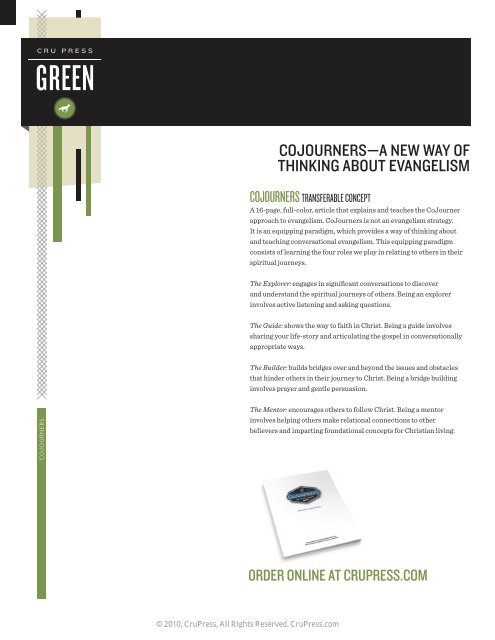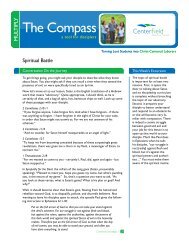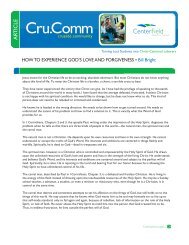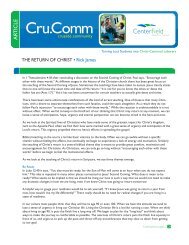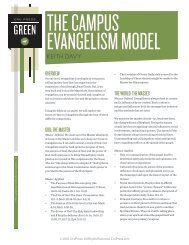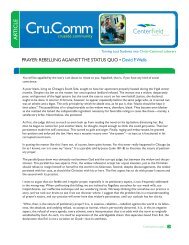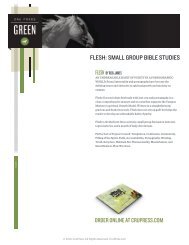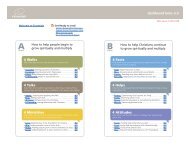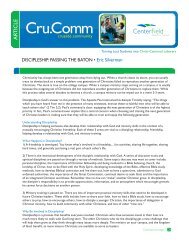CoJourners TC - Cru Press Green
CoJourners TC - Cru Press Green
CoJourners TC - Cru Press Green
You also want an ePaper? Increase the reach of your titles
YUMPU automatically turns print PDFs into web optimized ePapers that Google loves.
COJOURNERS TRANSFERABLE COJOURNERS CONCEPT 1<br />
COJOURNERS—A NEW WAY OF<br />
THINKING ABOUT EVANGELISM<br />
COJOURNERS TRANSFERABLE CONCEPT<br />
A 16-page, full-color, article that explains and teaches the CoJourner<br />
approach to evangelism. <strong>CoJourners</strong> is not an evangelism strategy.<br />
It is an equipping paradigm, which provides a way of thinking about<br />
and teaching conversational evangelism. This equipping paradigm<br />
consists of learning the four roles we play in relating to others in their<br />
spiritual journeys.<br />
The Explorer: engages in significant conversations to discover<br />
and understand the spiritual journeys of others. Being an explorer<br />
involves active listening and asking questions.<br />
The Guide: shows the way to faith in Christ. Being a guide involves<br />
sharing your life-story and articulating the gospel in conversationally<br />
appropriate ways.<br />
The Builder: builds bridges over and beyond the issues and obstacles<br />
that hinder others in their journey to Christ. Being a bridge building<br />
involves prayer and gentle persuasion.<br />
The Mentor: encourages others to follow Christ. Being a mentor<br />
involves helping others make relational connections to other<br />
believers and imparting foundational concepts for Christian living.<br />
ORDER ONLINE AT CRUPRESS.COM<br />
© 2010, <strong>Cru</strong><strong>Press</strong>, All Rights Reserved. <strong>Cru</strong><strong>Press</strong>.com
The Explorer<br />
Engage in significant<br />
conversations to discover<br />
and understand the spiritual<br />
journeys of others.<br />
Being an explorer involves<br />
active listening and asking<br />
questions. See page 2.<br />
The Guide<br />
Show the way to faith in<br />
Christ. Being a guide involves<br />
sharing your lifestory<br />
and articulating the<br />
gospel in conversationally<br />
appropriate ways. See<br />
page 4.<br />
The Builder<br />
Build bridges over and beyond<br />
the issues and obstacles<br />
that hinder others in<br />
their journey to Christ.<br />
Being a bridge building involves<br />
prayer and gentle<br />
persuasion. See page 5.<br />
The Mentor<br />
Encourage others to follow<br />
Christ. Being a mentor involves<br />
helping others<br />
make relational connections<br />
to other believers<br />
and imparting foundational<br />
concepts for Christian living.<br />
See page 6.<br />
<strong>CoJourners</strong><br />
© 2010, <strong>Cru</strong><strong>Press</strong>, All Rights Reserved. <strong>Cru</strong><strong>Press</strong>.com
<strong>CoJourners</strong><br />
Everyone is on a spiritual journey. We can’t help it. God created us that way.<br />
Granted, some are moving toward God and others are moving away from Him.<br />
Some pursue gods who aren’t God at all. Others are stuck in a spiritual quagmire<br />
and are not going anywhere.There are those who are spiritually open,while others<br />
are closed. Some are spiritually involved; some are not.But in each and every case,<br />
they are on a spiritual journey.<br />
Here is a second fact you can<br />
count on—God is already at work in<br />
people’s lives, whether they ever<br />
glance heavenward or not. He is not<br />
a passive observer or a shut-in desperately<br />
hoping for visitors.No,he is<br />
an active and almighty participant:<br />
the Lord of the Harvest who sends<br />
workers into his harvest field<br />
(Matthew 9:37-38); the God who created all people and nations<br />
determining “the times set for them and the exact places where<br />
they should live…that men would seek him and perhaps reach<br />
out for him and find him”(Acts 17:26-27).His Spirit is at work in<br />
the lives of people today (John 16:7-11) and he’s given us the privilege<br />
of being his“fellow workers”(1 Corinthians 3:9) by entering<br />
the spiritual journeys of others and helping them come to Jesus.<br />
There is one more foundational insight—people like to travel<br />
together.It’s true on road trips and on cross-country flights.Even<br />
climbing Mt. Everest, you want to take a Sherpa or two along.<br />
And I’m convinced it’s true on spiritual journeys as well. Now,<br />
obviously most people don’t think of spiritual journeys as a social<br />
endeavor.We’ve been raised to obey the eleventh commandment,<br />
“Keep thy religious views to thyself—thank you very<br />
much.”But here’s the key—while spiritual journeys are personal,<br />
they’re not private. We are designed as spiritual and relational<br />
beings. That means even a spiritual journey will be enhanced<br />
in relationship. Always has been, always will be—ducks quack,<br />
dogs bark, people talk. The inescapable correlative of all this is<br />
rather simple: people need people in their spiritual journeys.<br />
There is also a surprise in this. Listen carefully—despite public<br />
Keith Davy is the National Director<br />
of Research and Development for<br />
Campus <strong>Cru</strong>sade for Christ. His<br />
Orlando-based ministry keeps him<br />
writing, speaking, and consulting<br />
with ministry leaders, especially in<br />
the area of evangelism. When given the opportunity,<br />
he loves to go camping with his family,<br />
especially in the mountains of Colorado.<br />
opinion, relationships can often be<br />
enhanced by spiritual conversation.<br />
But more on that later.<br />
Let’s put it all together: Everyone<br />
is on a spiritual journey and God is<br />
already at work. We are given the<br />
privilege of entering into those journeys<br />
and becoming a part of what<br />
God is doing. People not only need<br />
us, many will want us to join them—if we do so appropriately.<br />
And that, my friends, is why it is important that we become<br />
<strong>CoJourners</strong>. “Hey, wait,” you say, “that’s not a word.” Right you<br />
are. But it is a compound expressing what no single English<br />
word adequately conveys. The prefix “co” means “with” and<br />
“journer”—well, that’s obvious. Put them together and you get<br />
the idea that we are joining others in their spiritual journeys,<br />
<strong>CoJourners</strong>. It could be with someone you’ve known for a long<br />
time or someone you’ve just met. The context may be students<br />
on a campus or adults in a community. Or it may involve<br />
moving from one culture to another. It doesn’t matter. The<br />
principles of being a CoJourner always remain the same—<br />
anybody, anytime, anywhere.<br />
Four Roles<br />
1<br />
© 2010, <strong>Cru</strong><strong>Press</strong>, All Rights Reserved. <strong>Cru</strong><strong>Press</strong>.com<br />
There are four primary roles that you can play in another person’s<br />
spiritual journey. They are not a formula: do this first, then<br />
that. Rather, they are roles that depend upon your relationship<br />
and the other person’s spiritual journey. The roles are explorer,<br />
guide, builder, and mentor.
The Explorer Discovering Spiritual Journeys<br />
Think of explorers throughout history. They entered unknown<br />
territory to discover, learn, and understand. (For historical<br />
accuracy we might also mention“plunder,”but that’s not the<br />
connection we’re looking for here.) Whatever their motivation,<br />
they embarked on journeys of discovery.In a similar way, we become<br />
spiritual explorers on journeys of discovery in the lives of<br />
others. Love compels us to engage conversationally, seeking to<br />
discover, learn and understand who they are and where they are<br />
going spiritually.<br />
What’s Their Story?<br />
The Steven Spielberg film Amistad chronicles the true story<br />
of a group of enslaved Africans, who in the spring of 1839,<br />
revolted aboard the Spanish slave ship La Amistad. Having overtaken<br />
their captors, they attempted to return to their beloved<br />
homeland. Given their absence of sailing experience, they fail<br />
miserably, and the ship was seized off the eastern seaboard of<br />
the United States. The captives were brought into the U.S. where<br />
they were charged with murder and awaited their fate in prison.<br />
An enthralling court battle ensued that captured the attention<br />
C O J O U R N E R S<br />
2<br />
© 2010, <strong>Cru</strong><strong>Press</strong>, All Rights Reserved. <strong>Cru</strong><strong>Press</strong>.com<br />
of the entire nation, confronting the very foundation of the<br />
American legal system. But for the men and women on trial, it<br />
was a fight for the basic right of all mankind…freedom. (By the<br />
way, this summary was adapted from promotional materials for<br />
Amistad and the book. Let’s give credit where credit is due.)<br />
A turning point in the movie occurs during a conversation<br />
between the elderly and eccentric ex-president, John Quincy<br />
Adams, and Mr. Theodore Joadson, a former African slave, now<br />
working for the abolition of slavery in America. Joadson seeks<br />
advice from Adams on how to try the case.<br />
Adams responds, “When I was an attorney a long time ago, I<br />
learned by trial and error, that whoever tells the best story wins.<br />
I offer that scrap of wisdom free of charge.”<br />
Joadson appears disappointed with the counsel and turns to<br />
leave, when Adams speaks again. “What is their story?”<br />
The dialogue continues:<br />
“Why, they are from West Africa.”<br />
“No, what is their story? Mr. Joadson, you are from where<br />
originally?”<br />
“Why, Georgia, sir.”<br />
“Georgia?”<br />
“Yes, sir.”
“Is that pretty much what you are, your story? No. You’re an<br />
ex-slave who has devoted his life to the abolition of slavery and<br />
overcoming great obstacles and hardships along the way, I imagine.<br />
That’s your story. Isn’t it? Hah. You and this young, so-called<br />
lawyer have proven you know what they are. They are Africans.<br />
Congratulations! What you don’t know, and as far as I can tell,<br />
haven’t bothered in the least to discover, is who they are. Right?”<br />
Did you hear those words?“…you know what they are...What<br />
you don’t know, and as far as I can tell, haven’t bothered in the<br />
least to discover, is who they are.”<br />
How often do we get to the end of an evangelistic presentation<br />
and discover “what they are,” unbelievers. But we don’t<br />
know “who they are.” We don’t know their story.<br />
That’s the role of the explorer—to discover who they are and<br />
what their story is. This discovery will determine how we help<br />
them on their journey.<br />
Here is an example: I sat next to Robert on a flight. What do<br />
you know about Robert spiritually? Unless you are speed reading<br />
this section without thinking, you probably answered,“Nothing.”<br />
But there is one thing you do know, right? Fact number 1: He is<br />
on a spiritual journey.<br />
So let me give you another clue. He’s French—a French dentist,<br />
as a matter of fact. Now what do you think? Is he spiritually<br />
near or spiritually far? More clues: he considers himself a French<br />
humanist. Hmm… Humanism is a man-centered worldview<br />
and not the path you normally think of as leading to Christ. So<br />
probably spiritually far, right?<br />
As I continued to explore Robert’s experiences and opinions,<br />
I discovered that he considered the church in his own country as<br />
irrelevant to the needs of society—not a good sign. Here we<br />
have a French humanist disillusioned by the church. It’s sounding<br />
more and more distant.<br />
But when Robert discovered my interest in spiritual matters,<br />
he revealed that he had tried to buy a Bible in a U.S. bookstore.<br />
(Whoa, that changes our view, doesn’t it?) After showing him a<br />
brief explanation of the gospel,he responded that he didn’t know<br />
if it was true or not, but (catch this, now) he hoped his children<br />
would decide it was. Why? Because if they believed it was true,<br />
he knew that they would experience a better life than if they didn’t.<br />
Robert was spiritually open, after all.<br />
Notice how your view of Robert changed with each new piece<br />
of information—initially assuming him to be spiritually distant,<br />
perhaps resistant because of his worldview, only to discover his<br />
genuine openness. This is what happens when we explore the<br />
lives of others—our assumptions are overturned as we gain<br />
insights into their story.You can’t guess where people are spiritually.<br />
You have to discover it.<br />
C O J O U R N E R S<br />
3<br />
© 2010, <strong>Cru</strong><strong>Press</strong>, All Rights Reserved. <strong>Cru</strong><strong>Press</strong>.com<br />
The Art of Exploring<br />
So, how do you explore? Like with Robert, it is a matter of<br />
asking questions and listening carefully. There are no magical<br />
questions that always work, but there are good questions. Here<br />
are a few.<br />
Try “How are you?” I’m serious—it is a good question. Ask<br />
people how they are, only really mean it. It’s common in our culture<br />
to ask the question; it’s rare to find anyone really wants to<br />
know the answer.“Fine” (or some other one-word response) is<br />
generally expected. But if you mean it, and explore a bit, you will<br />
find that many (and perhaps the majority) will genuinely<br />
appreciate someone who cares enough to find out how they are<br />
doing. The conversations that follow often provide revealing<br />
windows of the soul.<br />
But if you mean it, and explore a bit, you<br />
will find that many will genuinely appreciate<br />
someone who cares enough to find out<br />
how they are really doing. The conversations<br />
that follow often provide revealing windows<br />
of the soul.<br />
I was visiting with Mike, a neighbor who had recently moved<br />
onto our block.We discussed our houses and the common structural<br />
problem they had (a leaky window above the garage.) After<br />
comparing notes, I asked Mike, “Besides the home, how is the<br />
rest of life going?”<br />
“It’s getting better,” Mike responded.<br />
Did you hear that? That is a window of the soul—a comment<br />
that provides a view of what is true on the inside.All I needed to<br />
do was to invite him to “tell me more” and I began discovering<br />
what was going on in his life—the work issues that were leading<br />
to financial problems, which were the root of marital tensions<br />
which were negatively affecting the kids. All of these insights<br />
came in on our first real conversation together. Are you beginning<br />
to see why I said earlier that relationships can often be enhanced<br />
by spiritual conversations? Exploring is a way to get to<br />
know people better.<br />
Listening with genuine interest, you will often discover areas<br />
of common ground (like leaky windows) and unmet needs (with<br />
Mike: occupational, financial, marital, parental issues—ooh, life<br />
can be hard.) But the most valuable (and exciting) discoveries<br />
you will make are the traces of the Spirit—those places where<br />
God is at work in the lives of others. What do you suspect happened<br />
when Nanci, my wife, and I discovered that another of our<br />
neighbors had made a New Year’s resolution to get closer to God?<br />
Yep, an opportunity to “cojourn”!
Charting Spiritual Journeys<br />
One last perspective to help you explore: Remember journeys<br />
always have a past, present and future.You can talk about where<br />
you’ve been, figure out where you are and determine where<br />
you’re going.In the same way, spiritual journeys also have a past,<br />
present and future. That means you can explore their past experiences,<br />
their present attitudes and their future direction. There<br />
are no right questions for every situation. But here are some<br />
starters for you:<br />
Exploring the Past: What was your religious background as a<br />
child? What have you tried in your spiritual journey since?<br />
Exploring the Present: How has your search left you feeling?<br />
Where are you now in your spiritual journey?<br />
Exploring the Future: What do you desire most spiritually? Do<br />
you think you are moving toward God, away from God, or staying<br />
about the same?<br />
I could go on and list more questions. But if you know a few,<br />
the rest will arise naturally within the situation if you have a<br />
genuine interest in discovering who they are and what their<br />
story is.<br />
Think of the power and relational appropriateness of exploring.<br />
Can you ask questions of neighbors? Absolutely! Will<br />
coworkers appreciate your attempts to understand who they are<br />
and where they are coming from? Most will. Even strangers generally<br />
respond to someone who takes a genuine interest in them.<br />
Of course, you will need to be sensitive to their openness, not<br />
prying if they are uncomfortable sharing. But most people will<br />
respond positively and the discoveries you make will influence<br />
the other roles you will play in their lives.<br />
The Guide Showing the Way to Jesus<br />
What happens when you discover someone who is spiritually<br />
open? Lights flash, sirens sound and you make a public announcement,<br />
right? No, you assume another role—you become<br />
a guide. A guide, of course, is simply someone who shows the<br />
way,whether on trails or tours.Good guides help you understand<br />
what you are seeing or experiencing along the way. I was on a<br />
tour this week in St. Petersburg (Florida, not Russia. The guide<br />
even explained the architecture of a public restroom! Honestly.<br />
But ultimately the guide’s role is to lead you to the desired destination<br />
(though in St. Pete we just went around in a big circle.)<br />
When we are guides as <strong>CoJourners</strong>, we don’t lead people<br />
somewhere but to someone—that is, to Jesus—helping them<br />
understand their experiences along the way. There are three<br />
power tools that are basic equipment for you as a guide.<br />
C O J O U R N E R S<br />
4<br />
© 2010, <strong>Cru</strong><strong>Press</strong>, All Rights Reserved. <strong>Cru</strong><strong>Press</strong>.com<br />
Christian Community: Invite Them into It<br />
A healthy Christian community can have a profound influence<br />
in a person’s journey to Christ.A Christ-filled church service<br />
or a special fellowship activity allows them to experience an<br />
environment filled with love and truth and that’s what most people<br />
are looking for—unconditional love and truth. Even if the<br />
gospel is not explained (i.e., it’s not an evangelistic service), it<br />
will be experienced! Listen to the stories of those who have come<br />
to Christ and you will discover a significant number who first<br />
came into contact with a Christian community.As a high school<br />
athlete, I attended a Christian fellowship for a year and a half.<br />
I was either slow to learn or slow to turn. Either way, after<br />
processing the truth for months, a mini-crisis brought me to my<br />
turning point when I placed my faith in Christ. So invite others<br />
with spiritual interest to come with you into fellowship. It’s as<br />
easy as, “Hey, I’m going to ______. I really enjoy it because<br />
of______.Would you like to come along?”(But don’t forget to fill<br />
in the blanks.)<br />
Your Story: Share It Briefly<br />
What is the prerequisite for being a guide? It’s first-hand<br />
experience of the route,right? You are not going to choose a guide<br />
who has never been where you want to go. No, a good guide has<br />
personal knowledge of the journey ahead. Think of the implication<br />
of this. If you know Christ as your personal Savior and Lord,<br />
if you have come to him in faith, you qualify as a guide. Even the<br />
immoral Samaritan woman could serve as a guide for her village<br />
just moments after encountering Jesus.Read the account in John<br />
4. If God can use her one-sentence, seven-word story (“He told<br />
me everything I ever did”) to lead many villagers to faith (as<br />
seen in John 4:39), then he can use yours!<br />
Here is what is exciting about being a Co-<br />
Journer. After you have explored the lives<br />
and experiences of others, they will naturally<br />
be interested in your story. Often they will<br />
turn the conversation and ask about you.<br />
Here is what is exciting about being a CoJourner. After you<br />
have explored the lives and experiences of others, they will naturally<br />
be interested in your story.Often they will turn the conversation<br />
and ask about you.After exploring the life and work of an<br />
Muslim nephrologist (that means I was learning a lot about kidneys<br />
and medicine), he asked about my work and ministry.After<br />
listening to an account of the religious education of a twentysomething<br />
on a plane, he asked, “So what’s your story?” While<br />
exploring the experiences of a college student I just met on a
each, he asked,“So, how did you get into all this?” This kind of<br />
response is common. But if a person doesn’t inquire about you,<br />
simply ask,“Can I share a little bit of my story?” Just remember,<br />
it is a little bit of your story. Few will want the full two-hour, cinematic<br />
version of your whole life experience (no matter how exciting<br />
you think it has been.) In fact, they probably won’t want<br />
the ten-minute version. Try the Samaritan woman’s model. She<br />
said it all with a sentence and an intriguing question (John 4:29).<br />
You may need to share a little more. But the point is, don’t get<br />
carried away.<br />
The Gospel: Explain It Clearly<br />
The most powerful tool is the gospel. It is “the power of God<br />
for the salvation of everyone who believes…” (Romans 1:16).<br />
Being able to communicate it clearly and simply is essential. I’ve<br />
often used the three phrases of Romans 6:23 to conversationally<br />
communicate the gospel’s essence: 1. “For the wages of sin is<br />
death”; 2.“but the gift of God is eternal life”; 3.“in Christ Jesus<br />
our Lord.” I’ve also found a simple outline, like the one in the<br />
booklet Would You Like to Know God Personally? can be very<br />
helpful. It has everything you need to help many come to Christ.<br />
It guides the conversation, exposes our need, includes a clear explanation<br />
of why Jesus died for us, and provides an invitation<br />
to receive him as Savior and Lord through faith.<br />
But how do you get started talking about the<br />
gospel? Easy—you ask permission.<br />
But how do you get started talking about the gospel? Easy—<br />
you ask permission. Once you’ve explored and discovered some<br />
spiritual openness and have shared a bit of your own experience,<br />
simply ask, “Can I show you something that has really helped<br />
me understand this?”(Of course, you will modify that according<br />
to the situation.) If you are not in a setting where it’s appropriate<br />
to talk right then, add the key word “sometime.” It takes all the<br />
pressure off the moment.“Sometime I would love to show you<br />
something that has really helped me understand this.Would you<br />
be up for that?” Then you can get together for lunch, coffee, or<br />
some other preferred beverage and have a great conversation!<br />
By the way, do you remember the fellow on the beach who<br />
asked me how I“got into all this?”After telling him a little of my<br />
story and exploring more of his, I asked if I could show him a<br />
simple outline that explains how we can have a personal relationship<br />
with Christ. He was interested; so I did. When I explained<br />
the prayer in the booklet, I asked, “What do you think<br />
would happen if you sincerely prayed this today?” He replied,<br />
“Well, let’s find out.” And so we did. What a privilege to be a<br />
guide, showing the way to Jesus!<br />
C O J O U R N E R S<br />
5<br />
© 2010, <strong>Cru</strong><strong>Press</strong>, All Rights Reserved. <strong>Cru</strong><strong>Press</strong>.com<br />
The Builder Providing Bridges Over Spiritual Obstacles<br />
Not every conversation will be so open. In fact, many people<br />
are stuck on their spiritual journey. To help these you have to be<br />
a builder before you can become a guide. Suppose you are on a<br />
journey and you encounter an obstacle, let’s say a river.What do<br />
you need to continue on in your travels? You need a bridge, of<br />
course. The same thing is true for people who have encountered<br />
obstacles on their spiritual journeys.They need help getting over<br />
and beyond the issues that hold them back. The builder’s role is<br />
to provide bridges over the obstacles that keep people from coming<br />
to Jesus.<br />
There are many obstacles that keep people from coming to<br />
Christ or, for that matter, even considering him. Some are intellectual<br />
questions—“How can a good God allow evil?”Others involve<br />
emotional baggage and bad experiences—“I had religion<br />
crammed down my throat as a child.” On the surface they may<br />
sound quite different. But underneath all are spiritual issues; the<br />
enemy of our souls uses them to blind, bind and battle over the<br />
lives of the unbelieving. They must be dealt with using spiritual<br />
means. The two most important tools are prayer and gentle<br />
persuasion.<br />
Never underestimate the power of prayer in the lives of those<br />
who are not yet believers. Tennyson said, “More things are<br />
wrought in prayer than this world ever dreams of.”You may offer<br />
a quick prayer on the spot asking God to give you wisdom to<br />
respond to their issue (Colossians 4:6). Or you may spend<br />
extended periods of time laboring in prayer for a gospel breakthrough<br />
to bring light and salvation to a loved one (Romans<br />
10:1).A student prayer chain consistently prayed for my father’s<br />
salvation for three years before he came to faith in Christ.<br />
Through prayer we speak to God about a person who is spiritually<br />
stuck. But then we speak to the person about God with<br />
gentle persuasion, as “Christ’s ambassador, as though God were<br />
making his appeal through us” (2 Corinthians 5:20). We don’t<br />
come against her trying to win a debate or prove her wrong; we<br />
come beside her to help her get over and beyond the issue.<br />
Gentle persuasion involves a careful mix of grace and truth. It is<br />
an appealing tone with which we share God’s word in a safe and<br />
loving manner, often using personal experiences, insightful questions,<br />
and meaningful stories to help a person think differently<br />
about the issues they are stuck on.<br />
The Problem of Evil<br />
Here are a few examples. Remember Robert, the French<br />
humanist who wanted his children to believe the gospel? I asked<br />
him, “So, what is it that keeps you from knowing this is true?”<br />
He revealed his obstacle—the same obstacle that has plagued
countless individuals who have grappled with life’s pain and<br />
suffering. Robert expressed it this way,“Oh that is easy. It is suffering,<br />
but not suffering in general. It is the suffering of the<br />
children in the world. How can there be a good and loving God,<br />
who is powerful and in control, when children suffer so much<br />
in this world?”<br />
In silence I prayed to the Lord,“How do I best answer Robert<br />
on this?” Then it came to me. It’s our sin. Here is the essence of<br />
the conversation that followed.<br />
“Robert, I don’t want to minimize this issue. It is a significant<br />
question that many have wrestled with throughout the centuries.<br />
But I would say it is one of the reasons I believe this is true.”<br />
“Why is that?” he asked surprised.<br />
I responded,“Think about it. Why do children suffer in the<br />
world today? Children starve. But is that because there is not<br />
enough food in the world? Or is there enough food but people<br />
don’t distribute it to those who need it most?”<br />
“Oh, there’s enough food in the world,” he replied.<br />
“And children suffer as the result of wars. But who fights<br />
these wars? It’s people, right? And children suffer abuse in families,<br />
but who makes up those families? People. The list could go<br />
on. But whatever the truth is, it must adequately explain how<br />
people, who can at times be so good to one another, can also be<br />
evil and cause children to suffer. Robert, as I have considered<br />
religions and philosophy, the only explanation I have ever found<br />
that adequately explains how you and I can be so good and yet<br />
at times so evil is this message.”<br />
His response?“Can we talk more about this?”The obstacle was<br />
bridged and the conversation moved beyond to other matters.<br />
Religions: Many Paths to God<br />
Another common obstacle is the view that all religions are<br />
basically the same. That was Jason’s view. As we discussed life,<br />
belief and religion, Jason expressed it this way,“Though I don’t<br />
know if there is a god or not, if there is, I am sure all religions<br />
would ultimately lead to him. They are all basically the same. So<br />
it doesn’t matter which you would believe.”<br />
Here is how I responded,“Jason, you’re saying that since all<br />
religions are basically the same, choosing one is a matter of personal<br />
preference. Ultimately it doesn’t matter. In the end they all<br />
lead to the same place. Right?”<br />
“Yes,” he confirmed.<br />
Trying to help Jason think through the implications of this,<br />
I said,“I’m not sure you really believe that. Can I show you why?”<br />
“Okay.”<br />
“Take Christianity, for instance. I’m a Christian, but I don’t<br />
think that all forms of Christianity are equally good. Think<br />
about it. Wouldn’t you say there are forms of Christianity that<br />
C O J O U R N E R S<br />
are positive, leading to good works and benefiting others? But<br />
there are also some forms that are abusive and actually do more<br />
harm than good? There are extremists and even cults, right?”<br />
“Oh yes,”Jason replied.He went on,“And you don’t have to limit<br />
it to Christianity. The same is true with Islam. Look at what is<br />
happening in the Middle East, with the violence and bombings.”<br />
“So,” I continued, “You really do believe that it makes a<br />
difference which religion you choose, because what you believe<br />
can lead to good or bad results. The question is how do you sort<br />
out the good from the bad? Or even more to the point, how do<br />
you determine the true from the false.”<br />
Jason responded,“I hadn’t thought of it like that.” Of course,<br />
this didn’t convince Jason that there was a God. But it did enable<br />
the conversation to continue on without the “obstacle” that it<br />
doesn’t matter what you believe, it is just a matter of personal<br />
preference.<br />
What I have suggested in these examples is this: Many are<br />
unable (or unwilling) to consider the claims of Christ because<br />
of obstacles in their spiritual journey. As a CoJourner, helping<br />
them along the way, a positive step in the process is to help them<br />
think differently about the issue. This isn’t to imply that we have<br />
everything figured out and are able to handle any objection.<br />
Rather, it suggests that we can have healthy conversations and<br />
discuss matters reasonably (as with Robert or Jason.) And, at<br />
times, through prayer and gentle persuasion this obstacle can<br />
be removed so the conversation can continue to other matters—<br />
more importantly, to who Jesus is and what has he done for us.<br />
As you develop your skills as a bridge builder, you will want to<br />
learn simple ways of helping people deal with other issues, like:<br />
the reliability of the Bible; the hypocrisy of the church; how good<br />
is good enough; etc.<br />
The Mentor Encouraging Spiritual Growth<br />
6<br />
© 2010, <strong>Cru</strong><strong>Press</strong>, All Rights Reserved. <strong>Cru</strong><strong>Press</strong>.com<br />
As a CoJourner, helping them along the way,<br />
a positive step in the process is to help them<br />
think differently about the issue.<br />
Spiritual journeys do not end when people come to Jesus. In<br />
fact, in the most important sense, they are just beginning.What<br />
do people need after they have come to Christ? Two of their<br />
greatest needs are: (1) to connect with a community of believers<br />
who will help them grow; (2) to learn the foundational truths of<br />
following Christ.You can think of these as relational connections<br />
and life concepts.
Relational Connections<br />
There are three primary relational connections that new<br />
believers need. The first is one-on-one. They need a personal<br />
relationship with you or another believer who will encourage and<br />
guide them through the early stages of growth.That is,of course,<br />
the role of the mentor. But wise mentors don’t do it alone. They<br />
know the importance for the new believer of developing a small<br />
group of believing friends with whom they can grow and experience<br />
their new life in Christ. And new believers need a<br />
community of faith to become a part of—to worship, learn,<br />
fellowship and pray with. These three body connections provide<br />
a relationally rich environment for spiritual growth filled with<br />
grace and truth.It’s not hard to be a mentor for a younger believer.<br />
Spend time with them sharing what has helped you follow Christ.<br />
Introduce them to the friends with whom you fellowship and<br />
invite them to join you as you attend your community of faith.<br />
Life Concepts<br />
There are also life concepts that provide a solid foundation<br />
for the growth of the new believer. These include biblical concepts<br />
like:<br />
1. How can I be sure of my salvation?<br />
2. How can I experience God’s love and forgiveness?<br />
3. How can I be filled with the Spirit,walking in him moment<br />
by moment?<br />
4. How do I pray?<br />
5. How do I read God’s Word?<br />
6. What is the importance of fellowship?<br />
7. How can I be an effective witness?<br />
Life Concept discussion guides are available from <strong>Cru</strong><strong>Press</strong><br />
and can provide the tracks for your mentoring of new believers.<br />
But there is another group of believers you will discover<br />
through your exploring.These are the struggling believers. They<br />
have already come to Christ,but for a variety of different reasons,<br />
have become stuck and need help getting over the obstacles in<br />
their journey. The most helpful tool I use for helping these<br />
people is the Satisfied? booklet.<br />
On a flight home, I had a conversation with a college student<br />
named Sean. As I explored Sean’s life, I discovered that he had<br />
grown up in a Christian home and church and had accepted<br />
Christ as his Savior as a child. But when I asked about it, Sean<br />
admitted that he wasn’t satisfied with his Christian life at this<br />
stage.As we talked through the contents of the Satisfied? booklet,<br />
he was at a turning point in his journey. We prayed together as<br />
Sean surrendered his life to the Lord, asking God to fill him with<br />
His Spirit. A few months later, a friend of mine asked if I had<br />
shared the Satisfied? booklet with a student from Rollins College<br />
on a plane. I knew he must be referring to Sean, so I asked him<br />
C O J O U R N E R S<br />
how he knew about it. Sean had returned to school on fire for<br />
the Lord, gotten involved in the Campus <strong>Cru</strong>sade ministry and<br />
was now being discipled by my friend’s son. How many “Seans”<br />
do you know—believers who are struggling or stuck in their<br />
spiritual journey?<br />
Making the Most of Every Opportunity<br />
7<br />
© 2010, <strong>Cru</strong><strong>Press</strong>, All Rights Reserved. <strong>Cru</strong><strong>Press</strong>.com<br />
Now that we have unpacked the principles, it is important to<br />
consider the opportunities you will have to be a CoJourner with<br />
others. The apostle Paul exhorts us in Colossians 4:5,“Be wise in<br />
the way you act toward outsiders; make the most of every opportunity.”<br />
So what opportunities can you expect? Let me suggest<br />
three overlapping spheres of possibilities.<br />
First, there will be individuals you know (or will get to know)<br />
for whom God gives you a special burden, normally a growing<br />
sense of spiritual responsibility. Keep an active and growing<br />
prayer list of these individuals. It takes nothing more than a special<br />
page in your quiet-time notebook or a three-by-five card in<br />
your Bible. My current list has a mixture of neighbors and relatives<br />
on it.Yours will no doubt include classmates or coworkers<br />
(unless, like me, you work for a Christian organization and are<br />
surrounded by believers).With these individuals you will be able<br />
to initiate appropriate conversations and extend an invitation to<br />
walk on spiritual paths together. Also, because of your relationship,<br />
you will have the benefits of time and repeated contact. So<br />
if you do “cojourn” together, you can traverse great distances<br />
spiritually.<br />
A second set of opportunities will arise as<br />
divine appointments. These occur when God<br />
orchestrates circumstances so that you have<br />
an open door into the lives and spiritual<br />
journeys of individuals.<br />
A second set of opportunities will arise as divine appointments.<br />
These occur when God orchestrates circumstances so<br />
that you have an open door into the lives and spiritual journeys<br />
of others. These may be people you have met casually (a doctor,<br />
barber,neighbor or coworker) or people you meet in your travels.<br />
At times you will even experience divine appointments among<br />
long-term relationships (friends and relatives).They are not people<br />
on your prayer list for whom you are expecting an opportunity<br />
to talk spiritually; rather they come about by God’s planning.<br />
Divine appointments can often be dramatic and exciting, as<br />
you see God clearly at work in lives and circumstances. They can<br />
occur anytime and anywhere, even when you least expect them.<br />
My wife and I had such an experience. It was the end of an ideal
day as Nanci and I were enjoying a hike in the Rocky Mountain<br />
National Park.We had planned to be in Colorado Springs to visit<br />
three families that day,but when all three engagements canceled,<br />
we headed to the mountains instead. Hiking as far as we could<br />
safely go on our day trip, Nanci and I were among the last on the<br />
trails as dusk approached. Suddenly a backpacker, hurrying<br />
down, overtook us.<br />
A brief exchange on the trailside revealed that he had camped<br />
the night before, had climbed Longs Peak alone, and had intended<br />
to camp near some lakes above. But because of exhaustion,<br />
he had decided to come down our side of the mountain<br />
and head home for the night. (Do you see God’s hand at work?<br />
Not only had our plans changed but so had his.) His car was<br />
parked on the other side of the mountains (about a forty-minute<br />
drive away). He went on ahead, and as we reached the bottom of<br />
the trailhead, he was sleeping on the side of the road. After offering<br />
to give him a ride to his car, we began a fascinating discussion.<br />
In it we discovered that he was not just backpacking; he,<br />
too, was on a spiritual journey.<br />
Our questions revealed a great deal of common ground (note:<br />
I was being an explorer.) He was originally from Nebraska, our<br />
home state. Though he at first said he had no religious background,<br />
it came out that in college he had some exposure to the<br />
Fellowship of Christian Athletes, the very group through which<br />
I had come to know Christ. For the summer, he was living with<br />
his brother and sister-in-law. She was battling a cancerous brain<br />
tumor and it caused him to begin thinking deeply about life. A<br />
month earlier, I had been diagnosed with cancer. (Don’t worry.<br />
My treatment was successful. I had a check-up yesterday and<br />
my doc says I’m still cancer-free.)<br />
As our conversation progressed, I had the opportunity to<br />
share my story, including how my relationship with God was<br />
influencing my cancer journey. (Note: I was now a guide.) We<br />
discovered that he had tried reading the Bible but ws stuck in<br />
the Old Testament (of course.) As Nanci and I shared the gospel<br />
conversationally,he commented that it had never been explained<br />
so clearly to him before. It made sense and was what he desired.<br />
But he wasn’t ready to receive Christ.This was a big decision and<br />
he needed time to think about it. A week later he sent the following<br />
e-mail:<br />
I have thought a lot about accepting Christ in my life, and I decided<br />
that life is too tough not to have someone in my corner. So I<br />
have accepted him in my life and have been walking around with<br />
a sense of “quiet confidence.” I want to thank you for the ride and<br />
opening up to me and letting me open up to you. It wasn’t just a<br />
coincidence we met on that trail.<br />
Indeed it wasn’t a coincidence. It was a divine appointment.<br />
A final group of opportunities will come through intentional<br />
C O J O U R N E R S<br />
outreach.As you are involved with your local church or campus<br />
ministry, you may identify a group of people to help reach for<br />
Christ. This could be students at your school or young professionals.<br />
It may be with your local church’s outreach to the needy.<br />
The opportunities are endless for those who seek them.<br />
The Adventure Continues<br />
8<br />
© 2010, <strong>Cru</strong><strong>Press</strong>, All Rights Reserved. <strong>Cru</strong><strong>Press</strong>.com<br />
Well, there you have it—an overview of the CoJourner roles<br />
and principles. There are plenty of other resources available to<br />
help equip and encourage you as you move ahead.As you do, you<br />
will discover that nothing is as rewarding as seeing God use you<br />
to help another person come to Christ.At Thanksgiving a couple<br />
of years ago, I received an e-mail from a software engineer from<br />
Boston. In it he wrote,<br />
“I can't believe that it is almost Thanksgiving, and as the day<br />
approaches I look back on all the things I have to be thankful for<br />
this year. Tops on my list is the not so "chance meeting" we had on<br />
the airplane. I believe that God seated you next to me to let me<br />
know that the door was open to come back to Him, and that Jesus'<br />
hand was always there to welcome me… I just want to say<br />
THANKS for helping to lead me back to Jesus.”<br />
Remember: Everyone is on a spiritual journey. God is already<br />
at work and he wants to use you. That is what it means to be a<br />
CoJourner!<br />
©2007,<strong>Cru</strong><strong>Press</strong>.Campus <strong>Cru</strong>sade for Christ.All rights reserved.
<strong>CoJourners</strong> Outline<br />
Introduction<br />
A. Everyone is on a spiritual journey.<br />
B. God is at work. (Matt. 9:37-38; Acts 17:26-27; John 16:7-11)<br />
C. He wants to use you. (1 Corinthians 3:9)<br />
D. There are four roles: Explorer, Guide, Builder and Mentor.<br />
I. An Explorer – Discovering Spiritual Journeys<br />
A. Listening Carefully<br />
1. For windows of the soul.<br />
2. For common ground.<br />
3. For unmet needs<br />
4. For traces of the Spirit<br />
B. Asking Questions<br />
1. Exploring past experiences<br />
2. Exploring present attitudes<br />
3. Exploring future desires<br />
II. A Guide – Showing the Way to Jesus<br />
A. Inviting into Christian community<br />
B. Sharing your life story<br />
C. Explaining the gospel<br />
1. With a verse – Romans 6:23<br />
2. With outline (Would You Like to Know God Personally?)<br />
III. A Builder – Helping Over and Beyond Obstacles<br />
A. Prayer<br />
B. Gentle Persuasion<br />
1. Word of God<br />
2. Personal Experiences<br />
3. Insightful Questions<br />
4. Meaningful Stories<br />
IV. A Mentor – Encouraging Spiritual Growth<br />
A. Relational Connections<br />
1. One-on-one<br />
2. A small group of believing friends<br />
3. A community of faith<br />
B. Life Concepts<br />
1. Assurance<br />
2. God’s Love and Forgiveness<br />
3. The Filling of the Spirit<br />
4. Walking in the Spirit<br />
5. Prayer<br />
6. God’s Word<br />
7. Fellowship<br />
8. Witness<br />
Conclusion – Making the Most of Every Opportunity<br />
A.With priority people on your prayer list<br />
B. With divine appointments<br />
C. In strategic outreach<br />
C O J O U R N E R S<br />
9<br />
© 2010, <strong>Cru</strong><strong>Press</strong>, All Rights Reserved. <strong>Cru</strong><strong>Press</strong>.com<br />
CoJourner Questions for Discussion or Reflection<br />
1. What difference does the truth that “everyone is on a<br />
spiritual journey” make ot your view of witnessing?<br />
2. Why do we so easily forget that every person is on a<br />
spiritual journey?<br />
3. How does each of the following verses affect your confidence<br />
in witnessing? Matthews 9:37-38; Acts 17:26-27;<br />
John 16:7-11.<br />
4. What do you fear most in witnessing? How does having a<br />
relationally appropriate style for witness ease your fears?<br />
5. What is a window of the soul? How do you explore deeper<br />
when you recognize one in conversation?<br />
6. What are common unmet needs in lives of those who do<br />
not yet believe? How does Christ relate to each of these?<br />
7. What questions have you found most helpful in exploring<br />
the spiritual journeys of others?<br />
8. Why are healthy Christian communities attractive and<br />
helpful to spiritual seekers?<br />
9. Share the essence of your encounter or experience<br />
with Christ in two or three sentences. Would this be an<br />
attractive or intriguing statement to someone who is<br />
spiritually open?<br />
10. What is your most effective way of communicating the<br />
essence of the gospel to someone who is spiritually open?<br />
Do you feel the need for additional help or training?<br />
11. Brainstorm a list of obstacles that keep people from<br />
coming to or even considering Christ.<br />
12. What do you think are the three or four most common obstacles?<br />
How would you help someone who is stuck think<br />
differently about each of these?<br />
13. Who is on your prayer list as individuals yet to come to<br />
Christ? What obstacles appear to keep them from Christ?<br />
Pray about each.<br />
14. How did other believers (individually or as a group) play<br />
a significant role in your early days of following Jesus?<br />
15. Identify a key Bible passage for each of the seven life<br />
concepts listed in this CoJourner article. What other life<br />
concepts and key verses would you add to the list?
CoJourner Resource Options<br />
The growing family of CoJourner resources exists for two purposes:<br />
1. To encourage and equip you to be more effective for<br />
conversational witness in an approach appropriate to<br />
today’s culture.<br />
2. To enable you to encourage and equip others through readily<br />
available, economical (that means, cheap or free) and<br />
easily transferable concepts and resources.<br />
CoJourner Website<br />
Your first stop in exploring additional <strong>CoJourners</strong> resources is<br />
the website: www.cojourners.org. There you will find additional<br />
perspectives and principles, training resources, access to a<br />
devotional and small group discussions, a Bible study on developing<br />
a biblical philosophy of evangelism and, of course, a blog.<br />
All resources on the site are free for use and download. Just go<br />
to: www.cojourners.org<br />
C O J O U R N E R S<br />
The CoJourner Training Sessions<br />
Group training in CoJourner concepts can be adapted to a<br />
ariety of settings. Many use a one-session overview to introduce<br />
CoJourner concepts. It is essentially the content found in this<br />
introduction. A more complete five-session training is the<br />
primary training format.While the sessions can be delivered in<br />
a weekend conference, the five-week format makes an ideal<br />
outreach emphasis month. Teaching notes, note-taking outlines<br />
and an adaptable PowerPoint are all free and available at<br />
www.cojourners.org. The sessions include:<br />
The sessions include:<br />
1. The Overview<br />
2. The Explorer<br />
3. The Guide<br />
4. The Builder<br />
5. The Mentor<br />
10<br />
© 2010, <strong>Cru</strong><strong>Press</strong>, All Rights Reserved. <strong>Cru</strong><strong>Press</strong>.com
CoJourner Passages: A Devotional Journey<br />
For personal use, the 28-day CoJourner Passages: A Devotional<br />
Journey is an ideal quiet time supplement to help foster a heart<br />
for evangelism while taking small,biblically based steps of application.<br />
For groups, the devotional can introduce the CoJourner<br />
concepts as a stand-alone tool or reinforce the concepts when<br />
used in conjunction with the training sessions. In a five-week<br />
session,the devotionals are designed to prepare for the following<br />
week’s content. They are also an ideal discipleship tool to reinforce<br />
training in evangelism. Each week provides motivation,<br />
prayer and devotional thoughts related to a CoJourner role:<br />
Week 1 – The Explorer<br />
Week 2 – The Guide<br />
Week 3 – The Builder<br />
Week 4 – The Mentor<br />
The CoJourner Devotional is published by <strong>Cru</strong><strong>Press</strong> and can be<br />
purchased at: www.crupress.com<br />
C O J O U R N E R S<br />
CoJourner Equipment Pack<br />
11<br />
© 2010, <strong>Cru</strong><strong>Press</strong>, All Rights Reserved. <strong>Cru</strong><strong>Press</strong>.com<br />
The CoJourner Equipment Pack provides twenty 8-12 minute<br />
discussions for small groups, encouraging an outward-focused<br />
lifestyle and reinforcing (or introducing) the CoJourner concepts.<br />
Each discussion includes personal applications with small<br />
steps of witness, primarily focused on acquaintances.The equipment<br />
pack is composed of five sets of cards that address:<br />
1.1-1.4 – Heart Motivation<br />
2.1-2.4 – The Role of the Explorer<br />
3.1-3.4 – The Role of the Guide<br />
4.1-4.4 – The Role of the Builder<br />
5.1-5.4 – The Role of the Mentor<br />
(Coming soon: the Equipment Pack is being reprinted in an<br />
economical booklet format.)<br />
The CoJourner Equipment Pack is published by <strong>Cru</strong><strong>Press</strong> and<br />
can be purchased at: www.crupress.com
<strong>CoJourners</strong>: A Transferable Concept<br />
If you found theis article helpful you can use it to equip and train<br />
your Bible study, church or ministry for more effective personal<br />
witness. This article, the <strong>CoJourners</strong> Prospectus, is available in<br />
packs of 50 and can be ordered at www.crupress.com<br />
C O J O U R N E R S<br />
Additional Resources<br />
12<br />
© 2010, <strong>Cru</strong><strong>Press</strong>, All Rights Reserved. <strong>Cru</strong><strong>Press</strong>.com<br />
Visit: www.cojourners.org or www.cojourner.blogspot.com. An<br />
“encyclopedia of CoJourner thought” for Campus <strong>Cru</strong>sade staff<br />
members is growing at wiki.uscm.org. (In the search function,<br />
enter: <strong>CoJourners</strong>.) Also, a “<strong>CoJourners</strong> User Group” has been<br />
launched on Facebook. Search for <strong>CoJourners</strong> User Group.<br />
All resources can be purchased by going to www.crupress.com


